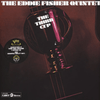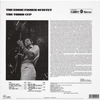



The Eddie Fisher Quintet - The Third Cup
Lead guitar - Eddie Fisher
Rhytm guitar - Phil Westmoreland
Organ - Bobby Selby
Bass - Paul Jackson
Drums - Kenny Rice
Written by Eddie Fisher
1 LP, standard sleeve
Original analog Master tape : YES
Heavy Press : 180g
Record color : black
Speed : 33 RPM
Size : 12'’
Stereo
Studio
Record Press : Third Man in Detroit, MI
Label : Verve By Request Series
Original Label : Cadet
Recorded in February 1969 at Saico Studio, St. Louis
Engineered and produced by Oliver Sain
Design and photography by Jerry Griffith
Liner Notes by Leo Chears
Originally released in April 1970
Reissued in March 2024
Tracks :
Side A:
1. Scorched Earth
2. A Dude Called Zeke
3. Shut Up
4. The Third Cup
Side B:
1. Two by Two
2. Shoo-Be-Doo-Be-Doo-Be-Do-Da-Day
3. The Shadow of Your Smile (Theme from The Sandpiper)
Reviews :
"An open letter to the Universal conglomerate: Please, please reissue The Third Cup. A beautifully heartfelt tribute to late bandleader Leo Gooden, this brilliant LP captures Eddie Fisher in a far different light than the blistering funk efforts on which his reputation largely rests, documenting an intimate soul-jazz session that anticipates the shimmering textures and supple rhythms that dominated jazz in the decade to come. Backed by a superlative combo featuring organist Robert Selby, bassist Paul Jackson, and rhythm guitarist Phil Westmoreland, Fisher unfurls a series of hypnotic, silken guitar grooves that employ space and atmosphere to remarkable effect. This is the tightest, most controlled playing of his career." AllMusic Review by Jason Ankeny.
The relationship between Zen and sound, or music, for that matter, is an interesting one. As another way of expressing the absence of opinions, ideas, and concepts—a desirable state in Zen—silence is a key aspect of Zen Buddhist practice, and Zen retreats are usually held in silence.
This is why some may view the title of Tony Scott’s album Music for Zen Meditation and Other Joys, which turns sixty this month, as a paradox. Certain Zen sects have historically been quite critical of including music as a part of spiritual practice. Even so, Zen rituals often include chanting and singing, sometimes accompanied by instruments. It is said that Dogen Zenji, founder of the Soto Zen school, encouraged chanting and liturgy as forms of practice.
By 1964, Zen was very much present in the West. The Japanese writer D.T. Suzuki popularized Zen in the first half of the 20th century, and Alan Watts had been promoting Zen and its underlying Taoist ideas and values since the late 1930s. The writings and teachings of Suzuki and Watts rose to prominence in the countercultural movement of the 1950s, with Beat writers like Gary Snyder and Allen Ginsberg visiting Japanese Buddhist temples to study Zen.
It was around that time that the composer John Cage incorporated Zen influences into his work as well, feeling it was wrong to attach judgment to sounds. The notation for his famous 1953 piece 4’33” simply reads “TACET,” which is a Latin musical term that translates to “it is silent.” The performance usually sees a solo pianist entering the stage, opening the instrument, sitting still for four minutes and thirty-three seconds, and then closing the instrument again.
"Zen would go on to be a source of inspiration for many influential musicians and popular American artists, including jazz icon John Coltrane, who visited Zen temples on his Japan tour in 1966, and singer-songwriter Leonard Cohen, who started studying Zen in the 1970s and even went into seclusion to become a Rinzai monk for some years in the mid-1990s.
When Tony Scott traveled to Japan in February 1964 to record Music for Zen Meditation and Other Joys, these ideas were very much in vogue among artists, writers, and other members of the larger bohemian landscape. Jazz, on the other hand, was in urgent need of new influences from the avant-garde, with the bop tradition having cooled off from its initial vibrancy by the mid-1940s.
Eddie Fisher was born in Little Rock, Arkansas in 1943. The teenage guitarist caught the traveling bug in the late fifties, touring first with Solomon Burke and subsequently stopping by Memphis, Tennessee. There Fisher mingled with Memphis stalwarts Isaac Hayes, Willie Mitchell, Booker T. Jones and Steve Cropper, receiving ample education. Settling in St. Louis in the mid-sixties, Fisher further delved into popular black urban music as guitarist and bandleader with blues master Albert King. Simultaneously, Fisher had honed his skills as a jazz player. In an interview with the Riverfront Times in 2002, Fisher says: ‘I really wanted to play jazz. (…) Albert let me do jazz instrumentals before he came onstage – tunes like Milestones and So What – so I was happy.’
In St. Louis, Fisher got associated with Leo Gooden, the 400-pound club owner, singer and politician and/or hustler who’d been a supporter of guitarist Grant Green a couple of years earlier. (According to Lou Donaldson, Leo Gooden assisted Donaldson and Green to Blue Note headquarter in New York in 1960, to recommend St. Louis resident Grant Green to Alfred Lion; the rest, as they say, is history) Fisher played in Leo’s Five, a group fronted by Gooden in his Blue Note club just out of East St. Louis in Alorton, Missouri. Also in that band were, at different times, saxophonists Fred Jackson and Hammiet Bluiett. Prominent visitors like Sonny Stitt, Miles Davis and Yusef Lateef sat in.
Fisher recorded the 45rpm single The Third Cup on Oliver Sain’s Vanessa label. The considerable airplay of Fisher’s debut on wax as a leader – it sold more than 5000 copies – prompted Cadet, the subsidiary label of Chess Records in Chicago, to release an entire album, also produced by Sain. The Third Cup was a good seller and Fisher’s follow up, The Next One Hundred Years, a big success. Fisher made another album for All Platinum in 1973, Hot Lunch, but then settled down in Centerfield, focusing primarily on social welfare projects with his wife.
On the surface, one may notice the influences of Fisher’s apprenticeship. The horn-like lines, integrated, repetitive blues riffs and blend of relaxation and bite point to fellow St. Louis cat Grant Green. There’s a bit of Kenny Burrell as well, the ease of the warm-blooded blues groove A Dude Called Zeke definitely brings to mind the work of the revered mainstream jazz guitarist. Big city blues, moreover, is in his veins. But, much like blues/jazz guitarists as Freddie Robinson, (although a bit more relaxed) it’s twisted to accommodate a definite, personal style. Fisher’s a fusion cook of note, combining lurid r&b swingers like the uptempo Shut Up and Shoo-Be-Doo-Be-Do-Da-Day, the cookin’ boogaloo tune Two By Two (written, by the way, by fellow St. Louis resident, the future avant-gardist Oliver Lake) with the sick, rock jazz vamp of Scorched Earth.
The group’s take on Harvey Mandel’s The Shadow Of Your Smile is a stiff affair, since subtle swing isn’t the rhythm section’s strong point. The title track is better. The Third Cup travels along the borderland route of soul jazz and CTI-type smooth stuff. It’s also one of the examples of the quintet’s intricate, hi-quality interplay, the contrasting rhythm of drums and bass providing the clever and meaty bottom for Fisher and the excellent organist Bobby Selby to work with. Up front the group’s lively and tasteful accompaniment is Fisher’s unmistakable, plucky, ringing tone. Very alluring." By Flophouse Magazine.
Rating:
AllMusic : 4.5 / 5 ; Discogs : 4.34 / 5



